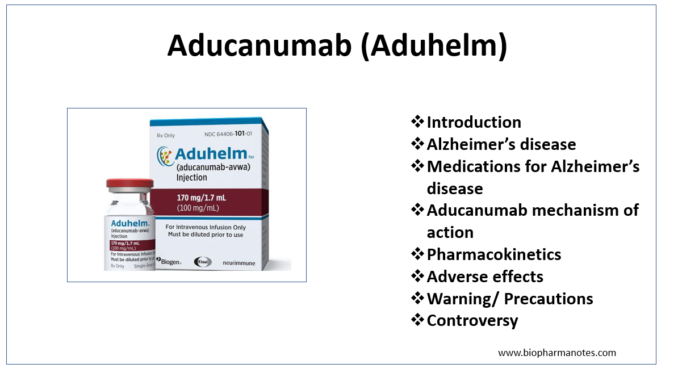
- Aducanumab is recently approved by FDA (7th June 2021) for treatment of Alzheimer’s disease. It is the first of its type and targets progression of disease which makes it different from current medications available for Alzheimer’s which target only symptoms.
- Its indication for Alzheimer’s disease is approved under accelerated approval by FDA based on its property to reduce amyloid beta plaques which is observed in patients treated with aducanumab.
What is Alzheimer’s disease?
- Alzheimer’s disease (AD) is a progressive neurodegenerative, non-psychiatric disorder resulting in progressive cognitive impairment and loss of short-term memory. It is mostly seen in old age people.
- Some of the most common symptoms include
- loss of short-term memory
- impairment in ability to calculate
- difficulty to remember directions and to perform day-to day activities like using common objects and tools. Ultimately this all leads to major functional and behavioral disabilities.
- AD patients frequently exhibit non-cognitive symptoms like depression, anxiety and aggressiveness which worsen as the disease progresses. Death, which may occur due to complication of immobility such as pneumonia or pulmonary embolism, usually occur within 6-12 years of onset.
- The pathological hallmarks of AD are extracellular senile plaques which are formed from accumulation of β- amyloid protein and intracellular neurofibrillary tangles.
Medications available for Alzheimer’s disease
- Till now there was no cure available for Alzheimer’s. The medications available were only for symptomatic treatment which help to slow worsening of symptoms and improve quality of life in AD patients.
- Some of these medications include NMDA receptor antagonist (memantine), cholinesterase inhibitor (donepezil, galantamine).
What is Aducanumab and how it acts?
- Aducanumab is recombinant human IgG1 (immunoglobulin gamma 1) monoclonal antibody having approximate molecular weight of 146 kDa. It is product of Biogen Inc. and is marketed under brand name Aduhelm.
- It has action against aggregated soluble and insoluble forms of amyloid beta which are the characteristic feature of AD. The results of clinical study showed that aducanumab reduces amyloid beta plaque in dose and time dependent manner. It also reduced markers of tau pathophysiology and neurodegeneration.
Pharmacokinetics of Aducanumab
- IT is administered as IV infusion over approximately one hour every four weeks and at least 21 days apart. Its recommended dose is 10 mg/kg. It is clear to opalescent and colorless to yellow solution and is available as single dose vial.
- Mean volume of distribution at steady state is 9.63 L. Its elimination is similar to endogenous IgG- by getting degraded into small peptides and amino acids via catabolic pathways. Its half-life is around 24.8 days.
- Effect of aducanumab is impacted by body weight, race, sex and age. However, the impact is not clinically significant.
Adverse Reactions
- It can cause hypersensitivity reaction similar to other therapeutic proteins.
- It can cause amyloid related imaging abnormalities edema (ARIA-E) characterized by brain edema or sulcal effusions and amyloid related imaging abnormalities hemosiderin deposition (ARIA-H) characterized by superficial siderosis and microhemorrhage.
- There is no adequate data regarding its use in pregnant and lactating woman. Carcinogenesis and mutagenesis study haven’t been performed.
Warning/ precaution
- Brain MRI (Magnetic Resonance Imaging) should be obtained before initiating treatment. MRI should be obtained before 7th infusion and 12th infusion.
Controversy related to Aducanumab approval
- Controversy has swirled approval of aducanumab. Scientists and physicians all over the world are both with and against its approval. There has been public debate on whether or not the aducanumab should be approved.
- FDA requires Phase 4 confirmatory trials to verify clinical benefits of aducanumab. If the data from phase 4 trials is not sufficient to verify benefit of aducanumab, it would be removed from the market.
- Application for approval of Aduhelm in Japan and European Union is under review.
Disclaimer- This content is solely purposed to provide information about Aducanumab. It is not intended to be a substitute for professional medical advice, diagnosis or treatment.
References
- FDA’s Decision to Approve New Treatment for Alzheimer’s Disease | FDA
- Role of physical exercise in Alzheimer’s disease. Wei-Wei Chen, Xia Zhang, Wen- Zuan Huang. Biomed Rep. 4(4):403-407.
- Delayed effects of combined stress and Aβ infusion on L-LTP of the dentate gyrus: Prevention by nicotine. Karim A. Alkadhi. Neuroscience Letters. 682:10-15.